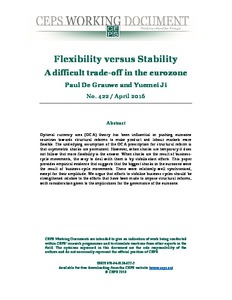Flexibility versus stability: a difficult trade-off in the eurozone

European Centre for Political Studies, Brussels
CEPS - Brussels
2016
31 p.
business cycle ; economic reform ; EMU ; labour market flexibility ; monetary policy ; structural adjustment
CEPS Working Documents
422
Financing and monetary policy
English
Bibliogr.
"Optimal currency area (OCA) theory has been influential in pushing eurozone countries towards structural reforms to make product and labour markets more flexible. The underlying assumption of the OCA prescription for structural reform is that asymmetric shocks are permanent. However, when shocks are temporary it does not follow that more flexibility is the answer. When shocks are the result of business-cycle movements, the way to deal with them is by stabilisation efforts. This paper provides empirical evidence that suggests that the biggest shocks in the eurozone were the result of business-cycle movements. These were relatively well synchronised, except for their amplitude. We argue that efforts to stabilise business cycles should be strengthened relative to the efforts that have been made to impose structural reforms, with consideration given to the implications for the governance of the eurozone."
Digital
The ETUI is co-funded by the European Union. Views and opinions expressed are however those of the author(s) only and do not necessarily reflect those of the European Union or the ETUI.